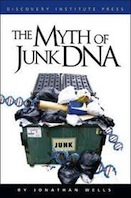 Evolution
Evolution
 Intelligent Design
Intelligent Design
Decoding ENCODE: A Q&A with Jonathan Wells
Biologist Dr. Jonathan Wells literally wrote the book on the Myth of Junk DNA. He answered some questions on the recent news from ENCODE.
Q. What’s significant about the ENCODE project and its findings?
A. The recent findings from ENCODE and related projects are significant for several reasons. First, the results from over a thousand experiments — involving dozens of laboratories and hundreds of scientists on three continents, published simultaneously in dozens of articles in five different journals — are remarkably consistent. Second, by providing abundant evidence that 80% or more of our DNA is functional, the results have greatly expanded our biological knowledge and may shed valuable light on some diseases. Third, the results demolish the argument used by Richard Dawkins and some other Darwinists that most of our DNA is “junk,” proving we could not have originated by design. As the journal Science put it, “Encode Project Writes Eulogy for Junk DNA.”
 Q. How did the Darwinist argument about “junk DNA” originate? Who coined the term, and why?
Q. How did the Darwinist argument about “junk DNA” originate? Who coined the term, and why?
A. Francis Crick (who with James Watson unraveled the molecular structure of DNA in 1953) thought the significance of DNA lay in its ability to code for proteins. After biologists discovered that only about 2% of our DNA actually encodes proteins, Susumu Ohno and David Comings independently coined the term “junk DNA” in 1972 to refer to most of the remaining 98%. Some biologists (such as Thomas Cavalier-Smith and Gabriel Dover) thought we might eventually discover functions for non-protein-coding DNA, but others (including Kenneth R. Miller and Richard Dawkins) seized on the notion of junk DNA as evidence for Darwinian evolution and against intelligent design — since a designer would presumably not have filled our DNA with so much junk, but centuries of mutations might have.
Q. How did we learn that the idea of “junk DNA” is wrong?
A. Even in 1972 there was some evidence that the idea of “junk DNA” was wrong, and evidence has been mounting ever since. After determining the sequence of the human genome in the 1990s, biologists embarked on several projects to analyze how it functions. Two such projects were ENCODE (“ENCyclopedia Of DNA Elements”) in the U.S. and FANTOM (Functional ANnoTation Of the Mammalian Genome) in Japan. By 2007 a growing amount of evidence suggested that most of our DNA is transcribed into RNAs (the chemical intermediate between DNA and protein), and that many of those RNAs�though not translated into proteins — may nevertheless be functional. That suggestion has now been confirmed.
Q. Do you see evidence of design in DNA? What about in the complex regulatory “switches,” as they’re being called, that make up much of the genetic dark matter (the former “junk” DNA)? Scientists are describing the ENCODE discoveries about DNA as almost unfathomably complex. Is there any biological benefit, or evidence of design, in the complexity?
A. Some people have argnued that DNA provides evidence for design. For example, Stephen C. Meyer argued in his 2009 book Signature in the Cell that highly specified DNA sequences are necessary to encode the functional proteins needed by a cell, and that the best explanation for those highly specified sequences is intelligent design rather than unguided evolution. And those are just the protein-coding portions of DNA; a similar (or even stronger) argument for design could presumably be made for the complex regulatory switches now being discovered in the non-protein-coding portions. In any case, it is clear that the argument against design based on “junk DNA” is no longer tenable.
Q. What do we still have to learn?
A. We’ve barely begun to understand living cells. For example, we still don’t understand what makes a particular assemblage of molecules alive. Nor do we understand how a relatively simple single-celled embryo develops into an extremely complex multicellular adult of the right species. For centuries to come biologists will be making fundamentally new discoveries about the features of living things — but probably not if they begin by assuming that those features are junk.

